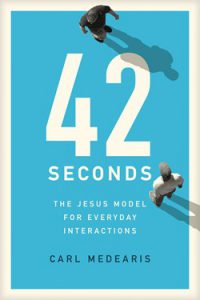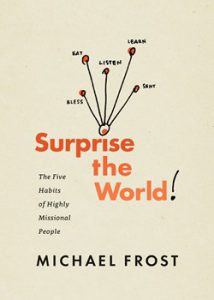October 11, 2019
Being a Better Neighbor Starts By Noticing Your Neighbor
Being a Better Neighbor Starts By Noticing Your Neighbor

Resources for being a better neighbor
Most of us are familiar with the account of Jesus and the young man commonly known as the rich young ruler (Mark 10:17-25). This young man approached Jesus, asking him what was necessary for him to obtain eternal life. In the midst of Jesus’ answer, the young guy (possibly interrupting Jesus) said he had kept the Ten Commandments since his childhood. It is possible—and I believe likely—that he was a bit arrogant with his reply; the text says he was trying to “justify himself.”
At this point in the narrative, Mark writes, “Then Jesus beholding him loved him” (KJV, emphasis added). The Greek word for “beholding” speaks of the study of the constellations; it means something much deeper than to simply notice or glance at. Thayer’s lexicon defines it this way:
1. to have (the power of) understanding
2. to discern mentally, observe, perceive, discover, understand
3. to turn the thoughts or direct the mind to a thing, to consider, contemplate, to look at, to weigh carefully, examine
Before We Love, We Must Notice
To “behold” is to intensely consider or give mind to something or someone. The text doesn’t say Jesus loved the young man and then beheld him. It flips the sequence. Although Jesus certainly loved the guy before he showed up, Mark is emphasizing that Jesus’ intentional consideration of the young man tapped into the love Jesus had for him.

Just last night my wife and I sat in our second-story library, enjoying a glass of wine and music. She was looking across the street toward the home of our neighbor Jess. Last weekend his wife, Linda, passed away after suffering the last few years from Alzheimer’s disease. Tears welled up in Sherri’s eyes. “I’ve been staring at the lights in Jess’s living room. He’s in there—alone. I can’t imagine how it must be for him.” Sherri was beholding Jess. She was also planning how we could reach out to him.
Most often beholding comes before compassion. It is not that we are not compassionate people, but we often are not moved with compassion because we don’t “behold” others. Consider the following passages (from the KJV, with emphasis added) that include the phrase “moved with compassion”:
But when he saw the multitudes, he was moved with compassion on them, because they fainted, and were scattered abroad, as sheep having no shepherd. –Matthew 9:36
And Jesus went forth, and saw a great multitude, and was moved with compassion toward them, and he healed their sick. –Matthew 14:14
The pace of our lives and consumer agendas greatly cloud our ability to behold others. Recently my wife and I were walking through downtown San Louis Obispo. As we approached a street corner, on our right we both saw a young man—probably in his mid-twenties—who obviously was living on the street. He scurried to a trashcan and grabbed a Starbucks cup that was sitting on top of it and quickly drank what was left in the cup. He then began rummaging through the rubbish in search of scrap food to eat.

To Love Our Neighbors, We Must First See Our Neighbors
In my hand was a container of leftover dessert from a fine meal we had just enjoyed. I quickly handed it to him and pulled out the meager three dollars in cash I had with me. What caught both Sherri and me off guard, though, were his eyes. They were filled with desperation and despair. We come across people begging on the streets just about everywhere we go, and we frequently give to such folks. This young man was not even begging. We beheld the young man and have been held by his eyes ever since. I am reminded here of the words of Frederick Buechner:
“If we are to love our neighbors, before doing anything else we must see our neighbors. With our imagination as well as our eyes, that is to say like artists, we must see not just their faces but the life behind and within their faces. Here it is love that is the frame we see them in.”[i]
Resources for being a better neighbor
There Is No Such Thing as Debt-Free Living for a Christian
I’m enough of a knucklehead that often I need the plainest of translations or paraphrases to get what the Scriptures are trying to say. I love Eugene Peterson’s take on Romans 13:8—”Don’t run up debts, except for the huge debt of love you owe each other. When you love others, you complete what the law has been after all along.” There is no such thing as debt-free living for a Christian. I owe you love right now. I can show you love this very second, but a minute from now, I will still owe you love.
Author Mike Mason writes, “Every person we meet is God’s representative to us, looking to collect His dues. Are we paying up? Are we paying ‘the continuing debt of love’ . . . or do we treat God’s people with the civilized equivalent of killing and beating: ignoring them, isolating ourselves, sitting in silent judgment, and rationalizing lovelessness?”[ii] Getting to know our neighbors, the employees and frequent fellow customers at our favorite coffee shop, gym, or pizza parlor comes part and parcel with the call of God on our lives to love our neighbor as ourselves. Loving starts with knowing, and knowing starts with getting to know.

When my wife and I moved into our current neighborhood the man who lived in the house behind ours was described by other neighbors as crazy and unfriendly. His house was unkempt and in extreme disrepair. And “Crazy Dan” was just as broken-down-looking as his home. We approached Dan, and after having him for meals in our home, my wife and I agreed he wasn’t crazy. He certainly wasn’t unfriendly. In fact, he was a really fun and wise person. A retired university professor, he was just lonely and a bit eccentric. But the labels others had put upon him served to push him into the recesses of the community. The “crazy” label became a category that cut him off from the life of the neighborhood. The definitions not only denied Dan the interaction he needed but also the gift he could be to the community.
A few months after Dan had to move to an assisted living complex, I ran into a couple who had been caring for his yard for several years. They told me a story that most of our neighbors would have been astounded to learn. When this couple first met Dan, they were homeless. They began doing odd jobs for him, and for almost two years Dan paid the rent on a home for them until they were back on their feet. Not only was Dan not crazy, he had a huge heart for others. Who would have known? Just the ones who took the time and effort to get to know.
Reflection
• How many neighbors around your home do you know by name?
• When was the last time you had a conversation of five minutes or more with one of your neighbors?
• Consider taking some time over the next week to behold your neighbors. Sit down and think deeply about their lives in light of what you know about them.
• At the end of each day this week, think back on the people you encountered face to face. What comes to mind as you behold them?
You have just read an excerpt from Next Door As It Is in Heaven: Living Out God’s Kingdom In Your Neighborhood by Lance Ford & Brad Brisco. In their book, they highlight the importance the Bible puts on “loving your neighbor as yourself,” second only to loving God. Other books that will inspire you to become a more thoughtful, connected neighbor include Talking About God: Honest Conversations About Spirituality, 42 Seconds: The Jesus Model for Everyday Interactions, and Surprise the Word: The Five Habits of Highly Missional People.
[i] Frederick Buechner, Beyond Words (New York: HarperCollins, 2014), 27.
[ii]Mason, Practicing the Presence of People, 15-16.








